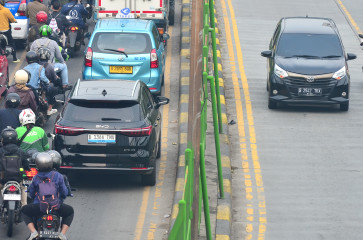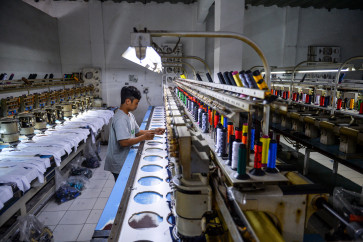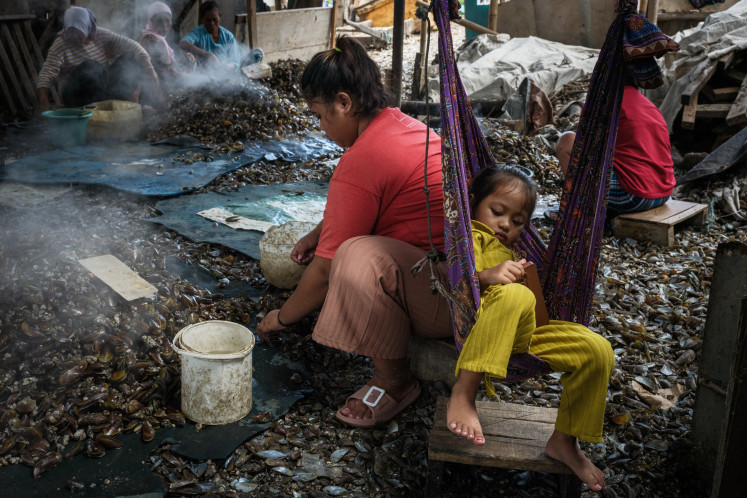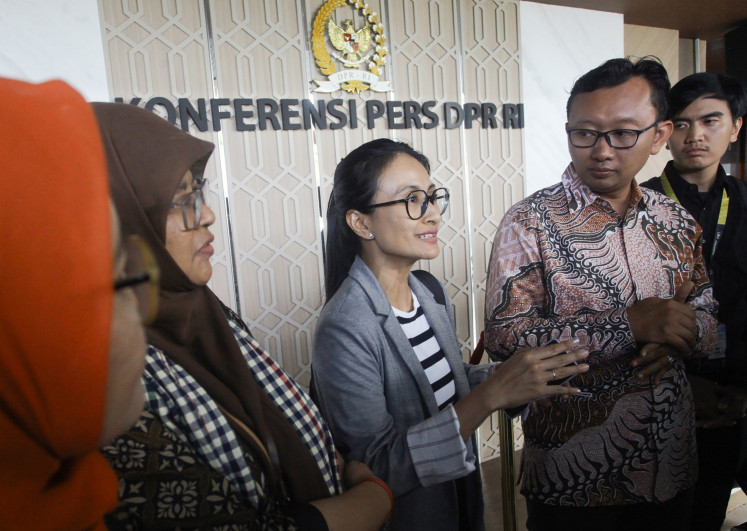Popular Reads
Top Results
Can't find what you're looking for?
View all search resultsPopular Reads
Top Results
Can't find what you're looking for?
View all search resultsSingapore calls for 'mindset' change as migrant workers are rehoused
"In land-scarce Singapore it is inevitable that some of the new dorm sites will be quite near residential areas, so all of us must do our part to reject the 'not in my backyard' mindset," said Lawrence Wong, co-head of the city's coronavirus taskforce.
Change text size
Gift Premium Articles
to Anyone
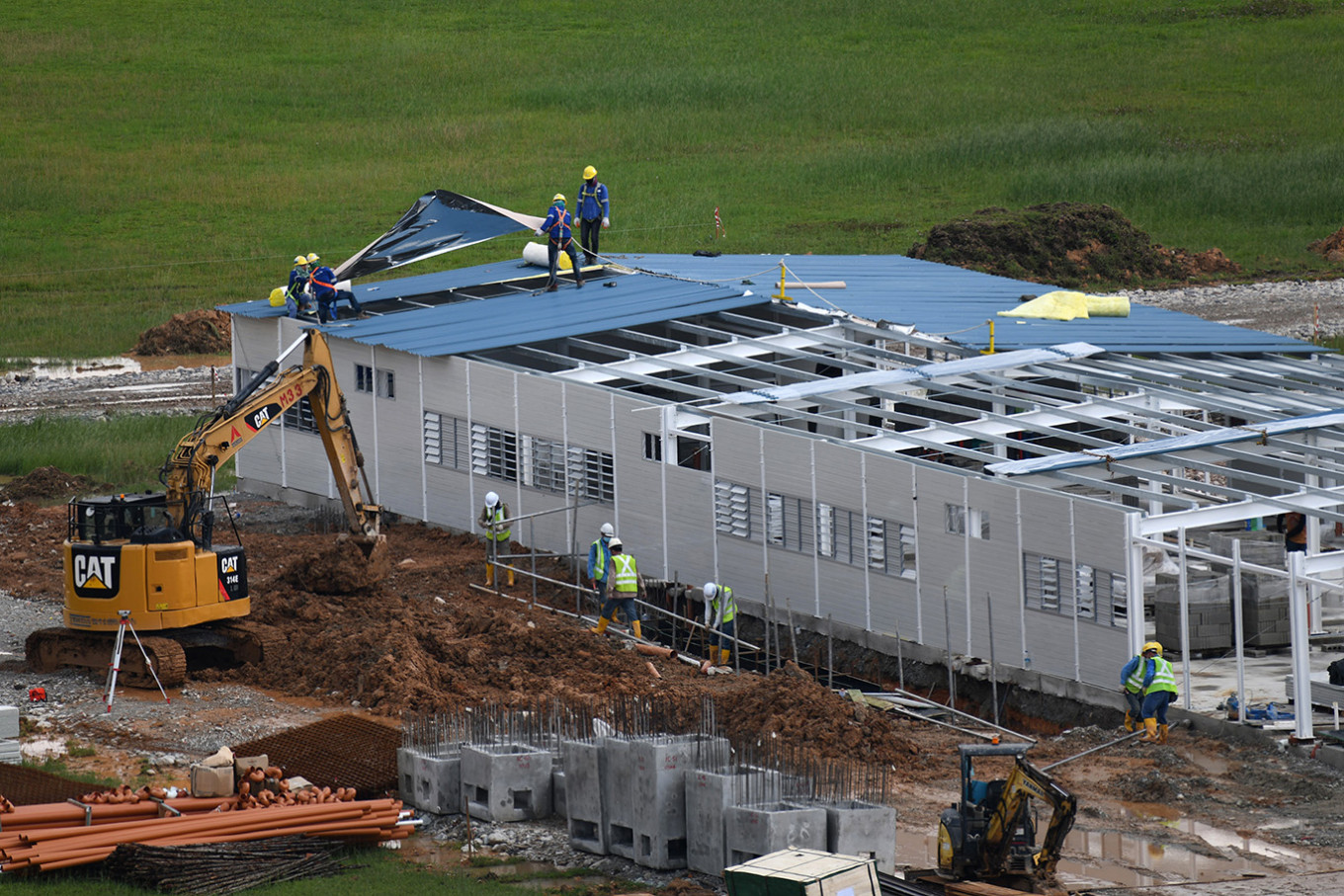 Workers contruct a new quick-build dormitory for foreign workers in Singapore on Friday, as Singapore eases its partial lockdown restrictions aimed at curbing the spread of the COVID-19. The government said it will build new dormitories for foreign workers as part of plans to reduce congestion, after a vast majority of the COVID-19 novel coronavirus infections in Singapore were linked to crowded migrant workers' dorms. (AFP/Roslan RAHMAN )
Workers contruct a new quick-build dormitory for foreign workers in Singapore on Friday, as Singapore eases its partial lockdown restrictions aimed at curbing the spread of the COVID-19. The government said it will build new dormitories for foreign workers as part of plans to reduce congestion, after a vast majority of the COVID-19 novel coronavirus infections in Singapore were linked to crowded migrant workers' dorms. (AFP/Roslan RAHMAN )
L
and-scarce Singapore has rejected criticism of its decision to move migrant workers into residential accommodation in the wake of the coronavirus pandemic, calling for greater tolerance and launching a social media campaign to promote empathy.
Low-income foreign workers packed into bunk rooms that lack proper hygiene facilities, account for more than 90% of Singapore's 38,000 COVID-19 cases.
The Southeast Asian nation has vowed to improve living conditions for migrant workers in the short-term, and build new dormitories for 100,000 workers over the next few years. Thousands of laborers have been moved into 36 temporary accommodations in the city.
Some of these sites - including empty public housing apartments and schools - are in residential neighborhoods, and comments on social media about risks to security, health and property prices drew a sharp response from the government.
"In land-scarce Singapore it is inevitable that some of the new dorm sites will be quite near residential areas, so all of us must do our part to reject the 'not in my backyard' mindset," said Lawrence Wong, co-head of the city's coronavirus taskforce.
"We really need to appreciate the contributions that our migrant workers have made, and will continue to make, in building Singapore, and welcome them as part of our community," Wong, also the national development minister, told parliament last week.
The pandemic has drawn attention to the stark inequalities in the wealthy city-state, where more than 300,000 laborers from Bangladesh, India and China often live in rooms for 12 to 20 men, working jobs that pay as little as S$20 ($14) a day.
Singapore's 43 foreign worker dormitories are located far from the city's glitzy tourist attractions and neat public housing estates where a majority of its 5.6 million people live.
Migrant rights groups, who for years had demanded improvements to worker housing, say it is the segregation of low-income foreign laborers that led to negative stereotyping.
"Singaporeans are not used to having migrant workers stay so close to them," said Alex Au, vice president of the Singaporean non-profit Transient Workers Count Too.
"But while we are seeing support from the community, there is mixed messaging from the government, whose new conditions for dormitories turns them into internment camps, with prison-like conditions for workers," he told the Thomson Reuters Foundation.
According to government guidelines issued last month, migrant workers are not allowed to mingle in their dorms, and can only step out for work.
To support workers relocated in residential neighborhoods, a group of Singaporeans have launched a #WelcomeInMyBackyard social media campaign.
Backed by the Ministry of Culture, the campaign encourages people to post notes of welcome, and organizes virtual talks between residents and migrant workers.
Hundreds of welcome notes have been translated into Tamil, Bengali and Chinese, said Nicole Ooi, a volunteer with the campaign.
"We wanted to shift the perspective on migrant workers and provide a platform where they could interact with residents," she said on Wednesday.
"The aim is to have migrant workers fully included and integrated into Singaporean society."

